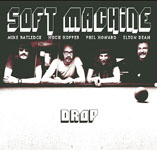Home » Jazz Articles » Album Review » Soft Machine: Drop
Soft Machine: Drop
Drop, along with Fifth (CBS, 1972)—possesses historical significance beyond its release. It marks a threshold for jazz-rock fusion, bearing greater resemblance to Tony Williams' original Lifetime, The Fourth Way, early Weather Report, and some of the late-'60s/early-'70s music from Gary Burton, John McLaughlin and Larry Coryell than the music of Mahavishnu Orchestra, Return to Forever and, indeed, Soft Machine itself after John Marshall's recruitment. Rhythmically, it was far freer, representing a brave attempt to fuse electric instrumentation with a more adventurous rhythm section.
Heaven for saxophonist Elton Dean and Howard, but challenging for keyboardist Mike Ratledge and bassist Hugh Hopper, who were both looking for more compositional variety than Howard's freeform drum style would allow (somewhere between Jack DeJohnette, Tony Williams, Robert Wyatt and Milford Graves). Interestingly, Howard's approach was anticipated in part by Wyatt's own End of an Ear (CBS, 1970), where he employed a very free but less relentless approach on "Las Vegas Tango."
Howard never takes a break, stops playing or slows down, but adds great flare to Ratledge's "Slightly All the Time" and "Out-Bloody-Rageous" from Third (CBS, 1970)—suites of contrasting musical ideas that, here, represent a steamroller of thoughts and musical fragments. Fifth's opener, "All White," is manic in its intensity, while "As If" contrasts with John Marshall's excellent but very controlled drumming, sounding more vibrant and powerful—almost bursting with energy despite its laidback structure.
The players respond differently to the freedom posed by this line-up. Dean revels in it and has never sounded better. Hopper, feeling redundant in this group, was struggling to work within the instrument's traditional foundational role, despite some admirable playing. This setting allowed him to free up his great melodic approach, taking his signature fuzz tone to extraordinary levels. Ratledge, one of the best improvisers and composers of his generation, stretches out more fully than at any time since the Wyatt-Ayers-Ratledge Soft Machine incarnartion, where he played pop songs with a Cecil Taylor-esque sensibility. What came after was not bad, but reflected a confinement of musical ideas rather than an organic expansion, setting the stage for the repetitiveness of Seven (CBS, 1973).
A fascinating document of one of the best bands in the world in full flight—before the conventions of commerce (Howard was allegedly let go after Soft Machine was fired as the opener for Weather Report in the U.K.) and control clipped its wings—Drop is an outstanding piece of work and a critical documentation of jazz-rock at its most adventurous.
Track Listing
Neo Caliban Grides; All White; Slightly All the Time; Drop; M.C.; Out-Bloody-Rageous; As If; Dark Swing; Intropigling; Pigling Bland.
Personnel
Soft Machine
band / ensemble / orchestraMike Ratledge: Lowrey organ, Fender Rhodes electric piano; Elton Dean: saxello, alto saxophone, Fender Rhodes electric piano; Hugh Hopper: bass; Phil Howard: drums.
Album information
Title: Drop | Year Released: 2009 | Record Label: Moonjune Records
< Previous
Bienvenida
Next >
Take Five With Donald Vega
Comments
About Soft Machine
Instrument: Band / ensemble / orchestra
Related Articles | Concerts | Albums | Photos | Similar ToTags
Concerts
For the Love of Jazz
 All About Jazz has been a pillar of jazz since 1995, championing it as an art form and, more importantly, supporting the musicians who create it. Our enduring commitment has made "AAJ" one of the most culturally important websites of its kind, read by hundreds of thousands of fans, musicians and industry figures every month.
All About Jazz has been a pillar of jazz since 1995, championing it as an art form and, more importantly, supporting the musicians who create it. Our enduring commitment has made "AAJ" one of the most culturally important websites of its kind, read by hundreds of thousands of fans, musicians and industry figures every month.



















